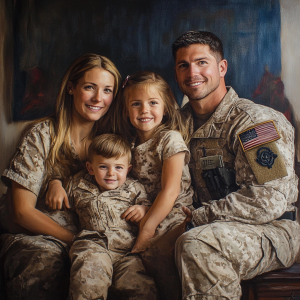
Prepping when you are a military family
As is often the case, I received an e-mail question from a reader which required more than just a simple yes or no answer. Now that I’m receiving 500+ of e-mails a day, I’m trying to be smart in managing my time better, as such, I thought it best to begin a new procedure when responding to reader’s e-mails. I’m frequently asked questions that require detailed answers, and yet, when I get the questions posed to me via e-mail, none of our other readers benefit from the information, and I’m spending an awful lot of time just answering one person’s question. While I’d love to answer everyone’s questions individually, I need to get real and remind myself that I simply cannot afford that kind of time and still meet all of my other commitments. So in the future, as I receive good questions that I believe will affect more people, then I’ll be sharing the questions and my answers here on the blog.
Today’s question is one that I’m sure most of you can relate to–not enough space to hold everything we need. But this reader has an additional curve ball thrown at her in that as a military wife who rarely spends more than a year in one place, she’s also restricted in terms of WEIGHT since the military moves her and her family each time he is reassigned.
I’m writing you, hoping you might be able to respond with some helpful tips. My husband and I have been preparing for a few years now. I still consider us “new” to emergency preparedness. I am confident that I have 6 months of food and water for my growing family. My one concern? We are a military family. I have to move often, this time around we are only staying put for a year. My supplies are growing, but the amount of weight the military allows us to move stays the same. How do I do it? How do I keep cold/frozen things fresh with us constantly on the move? Is there a better way that my brain is just over-looking?
I respect your opinion, and look forward to hearing from you
AND, thank you for all you do, my family appreciates it so much!
Dear A.D.
First of all I want to thank you and your husband for the sacrifice you put forth on behalf of our nation. I know that moving all the time is difficult for so many reasons.
Now, let’s get to your answer:
It sounds like you’ll need use a few strategies. First of all I’d eliminate any superfluous items and use my allotted weight as wisely as possible. The best use of “weight” would be sprouts and grains. That’s getting the most bang for your buck and using your weight allotment with premium nutrient foods. What few preppers realize is that the freezer really isn’t their greatest asset in a crisis. There are many more crisis scenarios which involve losing power than not. So I’d be sure to plan on not having access to electricity with the majority of my preparedness supplies.
The next thing I’d consider is to go the freeze-dried route for much of your food supplies since it weighs so little. A lot of folks think that freeze-dried is so much more expensive, but when you stay away from the entrees and focus on the individual produce you’ll see that it’s actually comparable to fresh produce but with the benefit of no bruising and such PLUS it’s actually a cleaner food.
Next, if I were you I’d be sure to incorporate more of my “food storage” into my regular kitchen pantry supplies and keep them replenished as I used them. The reason being is that you have to use space in your kitchen for food anyway, it might as well be food that you can enjoy long term. Instead of having “food storage” which is just more weight for items that you’re not really using, I’d start using my kitchen as my training ground for working with less familiar ingredients.
Next, every time I moved I’d dump my water storage from the containers and then make it a priority to refill all of the containers again as soon as I get to my new location.
Also, worst comes to worst you could consider just focusing on having the 5 basics: wheat, powdered milk, honey, salt, and oil.
Lastly, I’d invest heavily in the aspects of preparedness which require very little space such as Spiritual Preparedness, Mental Preparedness, and Physical Preparedness. These are the 3 most important priorities of being self-reliant and other than some books or some resistance weights, they require very little space or money. Books, classes, how to videos on YouTube and excellent articles you can find throughout the internet–these are all free or cheap ways that you can strengthen these first 3 Principles of Preparedness. I’ve discovered time and time again that focusing on these 3 areas is just as liberating and effective source of peace as an 1,000 square foot room full of prepping supplies.
I think one of the challenges that you have with your spouse being in the military is you being the point man to protect and provide for your family as it’s likely that your husband will be away when trouble strikes–even if all he did was a desk job because when a crisis scenario strikes, it’s all hands on deck in the military. So I’d invest in the knowledge, skills, and maintaining a strong mental fortitude so that you can be an asset to those around you in a time of crisis.
Another thing I’d advise is that you deploy a strict rule of multi-purpose prepping supplies in order to conserve space and weight. For example, a Global Sun Oven is great for cooking/baking but it’s also a great way to can a lot of foods, it’s also a great dehydrator, and you can even use it to sanitize bandages, dry clothing, and water purification. Not only will this strategy save on space, but it will also ensure you’re intimately familiar with your prepping supplies which will go a long ways to reduce stress in a time of crisis and not the least of all, it will save you a lot of money!
Forward thinking, I’d also make sure that you and your husband have simple yet effective ways of communicating so that he can just give you a benign code-word and you know exactly what that means. Obviously in the military there might be some advantage he’d have in finding out what crisis is looming before the general populace and yet he’d be ordered to not share specifics with anyone. If he could simply call you and use a code word then you could at least make use of the advance notice he might have on a crisis without him needing to compromise his ethics or proprietary information with specifics.
The good news is that yes, it’s perfectly possible to be more self-reliant, even in your scenario. It’s just all about being strategic in your planning and making the most of what you’ve got to work with.
Good luck!
Here’s to peace in your preparedness!
Kellene



21 Comments
Donna S. · July 18, 2012 at 9:18 pm
That was a thorough and totally awesome response. Well done.
Brad Graves · July 18, 2012 at 10:19 pm
I am a military guy who just moved his family across country. Two things first! 1 (one) I had a stop along the way to deposit the bulk of my supplies at a central location to help establish a small community of preppers (3 families – 1 yr supply minimum each). 2 (two) I kept a minimum supply to carry me the whole way and establish a new home.
The advice in the above article/response from Kellene is SOUND and ACCURATE. Now for the new stuff – if you have non-perishable supplies you want to move with you: One option is the do it yourself move. You get reimbursed at the gov’t rate for what they would move, and you simply take the rest of the cost on your own (many people find they actually come out ahead, but the labor is up to you). A partial do it yourself is also possible, but counts against your total weight allowance. The third option is to donate it to your church or social group (or neighbor prepper) and start again! Donating to a friend may allow you to reclaim your supplies if your evacuation plan calls for passing through them or grouping for safety. Of course that is an agreement between you two and is another conversation.
Summary: Keep the amount of non-perishables needed to feel comfortable with you along with water filtration and ammo. Deposit or donate what you feel is right. And finally move what is within your weight allowance, or do a full do it yourself move and you control everything.
Hope that helps!!!
Jamie · July 18, 2012 at 10:37 pm
I was thinking along the same lines Kellene and I was US Army for 13 years. If the husband can take classes like unit armorer, combat lifesaver, field Sanitation Team and NBC classes in addition to his MOS it will give you some great skills and knowledge for prepping as well as promotion points. Plus military books don’t count against your weight allowance
RangerRick · July 19, 2012 at 1:03 am
I did enjoy your response. What I have done in the past was ship Grey Hound bus in Country. It is about 25% of what Fed Ex / UPS / Post Office charges.
best regards, RR
scprepper · July 19, 2012 at 1:47 am
We do DITY moves. We have moved 4 times in the past 3 years, but have been able to keep almost everything. It has been worth the work. And Jamie is right, the books don’t count against you. My husband has brought home a lot of helpful manuals.
Thanks for a great post, Kellene!
Anna Gartin · July 19, 2012 at 2:26 am
Well done.. I’d add to that in saying to dehydrate as much vegetables as you can do, they are so lightweight and Wow do they take up little space. I use canning jars for mine.. 4 lbs. of carrots dehdyrated fit into 3 pint size jars. That’s alot of carrots to use in making soups, vegetables and casseroles.. I also use mine as filler in meatloafs. I’ve had some issues with the bags that come with it not sealing properly so I now stick to the jars. Best Wishes.
Kellene Bishop · July 19, 2012 at 4:42 am
Keep in mind that dehydrated actually does weigh a bit more than freeze-dried and it has higher nutritional content and requires less work to rehydrate. Dehydrated requires more water to reconstitute than freeze-dried.
brescon · July 19, 2012 at 1:26 pm
Hi kellene,
a while back you sent a very cryptic post about a pending water crisis. You did spur me on to fill my water barrels. Can you talk any more about that now? I was thinking at the time that perhaps it had to do with a radiation cloud from japan heading toward our west coast.
Thanks for all your info. The post on military preps has given me a couple new ideas and I’m not military. Always good info here, thanks,
Kellene Bishop · July 19, 2012 at 8:45 pm
Sorry, I don’t have anything to add other than the additional info that’s been trickling in has simply reconfirmed that position.
AutumnGal · July 19, 2012 at 2:33 pm
Thanks Kellene for addressing this question for Our Military families and it’s reassuring to me to know they/we are one and the same on prepping. In so doing you’ve answered many of my own (unasked) personal questions such as the value of Freeze Dried and/or Dehydrated. As seniors with some health issue, canning our own is not a viable option for us and would be very difficult to grab and go if need be. Our prep process has been mostly along the lines you’ve suggested here and that’s reassuring!
I’d personally like more detail from you and others experiences on the multiple uses of a Global Sun Oven. Sometimes the most obvious is the hardest to see.
Proud of you Kellene for making the (hard) decision to address the questions we pose through articles rather than a personal email. With your readers having the same goal, to be prepared, more often than not you will be answering many of our questions before we ask 🙂 Back to Basic and Simplicity is my rule of thumb which makes our daily life freeing. (But that’s what you’ve been saying all along, isn’t it? (Grins) Appreciate you and all you do for so many!
God blessings to all.
To those in the Military, may I say a heartfelt Thank You from our families!
Kellene Bishop · July 19, 2012 at 8:46 pm
Thank you for your kind words, AutumnGal
K Craft · July 19, 2012 at 2:50 pm
Kellene: “Also, worst comes to worst you could consider just focusing on having the 5 basics: wheat, powdered milk, honey, salt, and oil. ”
KIC: I’d like to also add powdered eggs as a basic. A meal a day of eggs in one form or another is great. I healed a macular hole in my eye by eating at least 4 eggs a day along with other things, but then that’s a whole story in itself. Eggs are very nutritious and that is important in a crisis situation.
Also, another thought to share – my first concentration for storage was to get a year’s supply of materials for Ezekiel bread. We love it any time. It is a nearly perfect food and the flour can be used to create pancakes instead of bread for emergency campfire cooking. We have Ezekiel pancakes regularly. For recipes, do a bing search and find many sources. I originally got it many years ago in a book called “God’s Recipe” which also has a chart of how much of each ingredient to store for x number of people for a year. We have used it for decades. I try to find organic grains for it.. http://www.aaoobfoods.com/ has several recipes, but currently they are rebuilding their crashed server.
Ezekiel bread is my survival base. I buy the grains and beans for the recipe in bulk and we nitrogen pack them ourselves in 5-gallon buckets. I make sure I have enough ingredients for 2 years for the number of people I will be responsible for. I use only olive oil too. Then I make sure I have plenty of powdered milk and eggs, and we like instant potatoes too. Anything after that is icing on the cake.
My plan of attack on the survival/prepping challenge is — After Ezekiel ingredients for both current use and very long term (my prep step #1), my prep step #2 was regular canned and frozen goods and personal stuff for 1 year and then prep step #3 was dehydrated and freeze-dried for medium/long term.
I hope this is helpful to someone. Thanks so much for all your hard work in informing us all. You are greatly appreciated.
—=== KIC ===—
Kellene Bishop · July 19, 2012 at 8:47 pm
I LOVE my Ezekiel bread. Guess I should post a couple of my recipes. Duh!
Sarah Colvill · July 19, 2012 at 3:54 pm
From the point of view of someone who absolutely must watch everything what we have, due to our being constantly on the move and weight and space limitations… We use a LOT of freeze dried/dehydrated foods purchased in #10 cans and combined with the fresh meats and dairy that we are able to get along the way. A lot of the meals are things that I make with them in the crock pot. (Adding a solar oven and a solar generator are on my wish list.) I believe the most important things we carry though are the books we have to help us identify edibles that are native to North America and what native plants can be used to treat what illnesses and injuries. We also carry a book on how to gather water from places where you might think there is no water and how to set snares and traps. In general books on how to truly live off the land. Living in a semi truck, constantly criss-crossing our country, is not the best lifestyle for prepping, but it can be done.
Sam · July 19, 2012 at 4:22 pm
We spent 30 yrs. in and never let the Military take our valuables. Boxes of silverware etc always seemed to get lost. Get a u-haul or buy a small trailer that you can keep or sell right away when you get to your next duty station.
You can never go wrong with a trailer. Just make sure that the lights work and you have really good heavy duty tires and at least 2 spares. Use Walkie-talkies between cars if your lucky enough to have your hubby around when the actual move comes. Be sure you know how to back up and not just your hubby. Nothing worse then pulling into a gas station and not being able to get turned around. Your a military wife and as usual alot is expected.
brescon · July 19, 2012 at 11:39 pm
Yes, you should !!!
Southern AZ · July 21, 2012 at 1:42 am
I went to a canning event with a friend who is a LDS Church member (I am not a member). There was a local incoming military family who planned their storage around their moves. They used their more perishable items for 3 to 6 months in advance of the move, primarily the water-canned, the dry dairy, dehydrated onions, potato puffs, carrots and other items that may not have liked temperature extremes of a move. They essentially filled their vehicle with the replacements available at the Bishop’s Storehouse. Our local LDS church is very supportive of military personnel, regardless of their religious affiliation. Once you know where you are going, check with your local LDS church for a cotact who is working at the storehouse nearest your new duty station, or the food storage rep at your local LDS church. This could provide a lower-cost option for replacing any long-term dry storage compromised in the move. If you download and review the LDS preparedness manual, one of the entries ( if I remember it correctly) indicates that a neighbor who is not in the church but is prepared and is not anti-LDS is a preferable neighbor to a LDS church member who is not prepared!
Wendy · July 22, 2012 at 6:30 am
Ok Kellene, you mentioned a new one: canning food using your solar oven and sanitizing bandages and clothes. How in the heck do I do these two things. I cook and dehydrate and purify water in mine but never canned with it or sanitized clothes. Please share!
Kellene Bishop · July 22, 2012 at 10:49 am
Just look up “solar oven” with the quotation marks in the search bar here and you’ll find exactly what you want. 🙂
margie · July 24, 2012 at 10:45 pm
Thankyou Kellene!
Sharon · August 6, 2012 at 4:16 am
Thank you for answering my question in this one. Now we feel confident that we can do better by ordering freeze dried foods now for our our military move also. Besides, with only 2 of us in the house, we seem to waste too much produce because we can’t eat it as fast as it deteriorates. I don’t like canned veggies and freeze dried weighs so much less. We will be investing in a solar oven also. If Obama gets re-elected my husband will immediately retire he said. He has been in for 29 years and is up for another 3 years or longer if he so wishes. Thank you again. I love your help that you do for us all and love the webinars.
Comments are closed.